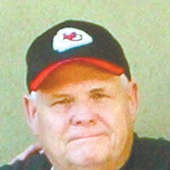It's liftoff time again
"The Astronaut Wives Club" aired last week as a new summer television series. Time and the viewing practices of today's public, will determine if it is a success. Regardless, it reminded me once more, that the space program has been a big part of my life and that of our country.
There were two events in my life that highlighted my connection to NASA. Both of them involved the launching of spacecraft, and a school classroom. For me those two events represent the bookends of a legendary time period, when the space race was a priority for our country.
The first event was dramatically depicted in the first episode of the new television series. On May 5, 1961, America launched its first astronaut (Alan Shepherd), into space. Although this flight lasted only about 15 minutes, it was the first time we had been able to catapult one of our astronauts, into the vacuum of space.
The second aerospace and school connected event, occurred on January 28, 1986. That was the morning that the Space Shuttle Challenger, was lost in a fiery explosion.
I was in my sixth grade classroom at Bryan grade school, on the morning of the first Mercury spacecraft launch. In that era there was not a single television in the entire building, so Mrs. Marie Thomas, my teacher, let us listen to the radio. This was back when there were only six classrooms at Bryan. I am not sure what they did in the other classes that day. Remember, that was when you had one teacher for the entire day.
When I think back to those days, I am astounded to see just how much has changed in our world where technology in schools is concerned. Back then we thought movie day was great fun. Our teachers would take us to the cafeteria, and show documentaries on an old-fashioned projector and pull down screen.
Many innovations have come about in the decades since that time, and a lot of them owe their existence to the space program. These days a kid can view almost anything on their phone or their new iWatch. The smart phones kids handle today are many times more powerful than the computers used in the early days of our advances into space.
As I was listing to the radio that morning, I remember thinking that this was going to be a great adventure, and although I was both nervous and excited, I did not have any inkling, that there could be a catastrophic failure.
The race to space was a new frontier for our country, and was almost like a movie for a kid my age. It seemed like it took forever for them to get the rocket ready to launch, and more than once, they stopped the countdown for some minor issue. When it finally came down to the actual launch, every kid in my class counted our loud with the launch director: "10-9-8-7-6-5-4-3-2-1 liftoff!"
Just as it was depicted in the first episode of this new television series, there were some tense moments while we all waited for Shepherd to respond to the call from the ground -- "Friendship 7 this is ground control. Do you copy?" After several attempts with no answer, even those of us in that sixth grade class were beginning to get very worried.
Shepherd finally answered and went on to complete the mission. He and his wife as the new television series shows, were invited to the White House, and were instant mega stars in our society. This week there will be a new episode, and it will cover the second Mercury launch. On that mission there was a mishap at the end of the flight with Gus Grissom aboard. I am looking forward to seeing how the writers cover that part of the story.
Grisson's Mercury capsule sank in the ocean, when an emergency hatch mysteriously exploded. Some people blamed him, but a NASA investigation proved otherwise. Grissom was tragically killed a few years later, during an Apollo Moon Mission test.
Just shy of 25 years later, I was in another classroom. This time I was a high school American History teacher. By 1986 much had changed in our schools, and in our country's space program.
We no longer had movies on reel type projectors. Oh no, by the mid '80s we were so modern, that we had VCR tape machines. Does that date you and me both?
By 1986, the Space Shuttle missions had become so regular and commonplace, that most Americans didn't even watch the launches or return flights on television.
This Challenger flight was somewhat different. NASA had selected a middle school teacher, Christa McAuliffe, to go into space and teach kids in a special school program, via live feed from the shuttle.
In the middle of my morning classes, a high school office cadet knocked on my classroom door. I noticed right away that something was wrong, as she had some tears streaming down her face.
She exclaimed, "The space shuttle just blew up!" It didn't register in my mind for a moment. Everyone was in shock, as the U.S. had never lost a spacecraft on an actual mission before.
Our principal had televisions moved into several classrooms, and for the rest of the day, we watched the live news coverage of the disaster.
Now here we are some 29 years later. We no longer have a space race. Manned missions, except to the International Space Station, have virtually disappeared. It seems more likely that we will send drones into space instead of people in the future.
If that happens, I will miss the old "space race." Some people claim it costs too much. I think that's a mistake. Our classrooms and our country would really benefit from some new "LIFTOFFS!"

